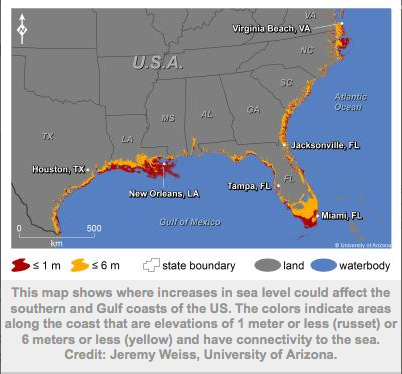Southern leaders fiddle while coasts threatened with drowning

Sea levels around the world are rising because of expanding oceans and melting of land-based ice caused by global warming, and scientists have warned that rising seas coupled with a likely increase in hurricane intensity and storm surge will be among the most serious consequences of climate change for the U.S. South.
But at the very time Southern coastal states are threatened with coastal land loss and inundation, their leaders are standing in the way of efforts to address the problem.
Last week, North Carolina Gov. Beverly Perdue (D) allowed a controversial bill that blocks state action on sea level rise to become law. Rather than vetoing H819, as environmental advocates urged her to do, Perdue let it pass into law without her signature.
The measure, championed by development interests and pushed by the legislature's Republican leadership, bars state agencies from taking into account scientific predictions of accelerated sea level rise for four years while ordering the state's Coastal Resources Commission to further study the issue. A previous CRC study that reviewed the best science to date predicted a one-meter rise by 2100.
The original version of the bill would have ordered the CRC to consider only a steady, linear rate of rise based in historic patterns rather than taking into account scientific models that predict a faster rate of rise due to melting ice and expanding oceans. That version was toned down following public uproar over its anti-scientism.
Unfortunately, North Carolina is not alone in its efforts to separate coastal planning from science. As the Associated Press reported last week:
In Virginia, legislators removed language about "sea-level rise" from a study bill. They replaced it with the phrase many lawmakers were more comfortable with -- "recurrent flooding." Politicians felt the previous language was left-leaning. Texas is working on a coastal plan to address the issue, but got some attention in 2010 when the Texas Commission on Environmental Quality tried to remove the terms "global warming" and "accelerated sea-level rise" from a publication it funded. After scientists subsequently threatened to pull their work from the Texas publication, the state relented.
And in Louisiana -- a state where coastal communities are facing very real existential threats due to rising waters -- political leaders have also been blocking efforts to address the problem at its roots.
As Bob Marshall of the New Orleans Times-Picayune reported last week, the Republican members of Louisiana's U.S. House delegation recently voted for a bill that would prevent regulation of atmosphere-warming carbon pollution. Among the lawmakers who approved the measure were representatives of coastal parishes already slipping into the Gulf of Mexico.
And they're not alone in their embrace of inaction on climate change, as Marshall observed:
We're not doing much better over in the Senate.
Our Democrat, Sen. Mary Landrieu, has repeatedly split with her party's majority and voted to block greenhouse gas regulations. The usual excuse: Too costly to industry.
Our Republican senator, David Vitter, is even more rabid in his opposition. At one point he voted to prevent funding for federal regional climate change offices, and he continues to state his that opinion global warming is not caused by humans -- never mind what the world's experts have reported.
Marshall raised concerns about whether Louisiana leaders' refusal to take action on climate change will eventually cause the rest of the nation to abandon efforts to save the state's threatened coast. He likened coming to Louisiana's rescue to "funding cancer treatment for a man who refuses to quit smoking."
Given that North Carolina and Virginia are in an area of the Atlantic Coast that's been identified as a "hotspot" for rising seas, their leaders might give Marshall's concerns some consideration.
(Map by Jeremy Weiss, University of Arizona, via Phys.org.)
Tags
Sue Sturgis
Sue is the former editorial director of Facing South and the Institute for Southern Studies.
